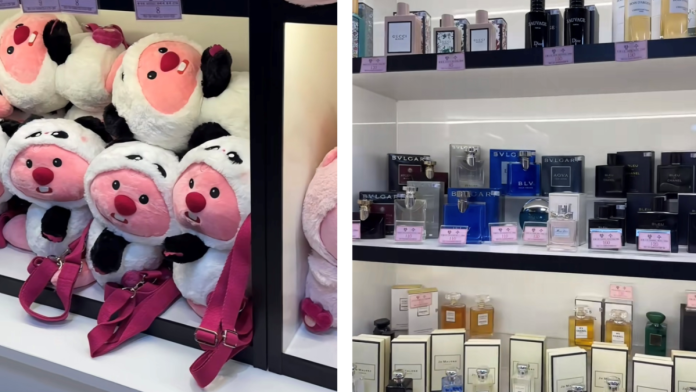Recent videos posted by Chinese social media users have revealed a surprising scene inside Pyongyang, the capital of North Korea. Shelves in local stores are filled with foreign luxury goods, including perfumes, cosmetics, and imported beer. This has raised questions about how such products are entering the country despite United Nations sanctions that ban the sale of luxury items to North Korea.
In one video uploaded to the Chinese app Xiaohongshu, a user showed rows of international brands at Ryugyong Golden Plaza, a shopping center that opened in July 2023. Popular names like Chanel, Dior, Lancome, SK-II, and Huawei were seen displayed with North Korea’s distinctive pink price labels. The user, who claimed to be involved in trade between China and North Korea, said that most of these products were sourced from China.
An earlier video from September showed Japanese goods in Pyongyang supermarkets, including mothballs featuring the Snoopy cartoon character. The user explained that Snoopy’s face was blacked out with marker because American cultural symbols are banned in North Korea.
Global crackdown intensifies as US sanctions 50 firms aiding Iran’s oil exports
Imported Luxury Goods and Beverages on Display
More posts have shown shelves stacked with perfumes and imported alcohol in Pyongyang’s Daesung Department Store. Videos revealed perfumes from Gucci, Dior, Jo Malone, Bulgari, and Chanel, priced between $80 and $150 per bottle. The Daesung Department Store is reportedly operated by Room 39, a powerful office under the Workers’ Party of Korea that manages the regime’s foreign currency and luxury imports.
Another video from early October showed a restaurant in Pyongyang serving foreign beer. A receipt listed a bottle of Mexican Corona for $3.40 and two bottles of Japanese Asahi for $2.80 each. Viewers on Chinese social media questioned whether the restaurant was meant only for foreigners, as such beverages are rare in North Korean eateries.
These findings come despite UN Security Council Resolution 2356, which bans the sale of luxury goods and alcoholic beverages to North Korea. The sanctions were meant to limit access to products that could fund or benefit the regime. However, the new footage shows that these restrictions are being quietly bypassed, likely through trade routes linked to China.
Luxury goods are not new in North Korea’s elite circles. Leader Kim Jong-un has often been seen using expensive imported items, such as a Mercedes-Maybach GLS 600 SUV reportedly worth around $200,000. His daughter, Ju-ae, has been photographed wearing Dior clothing, while his sister, Kim Yo-jong, has carried a Dior handbag during public events. These examples reinforce the belief that luxury imports remain accessible to the country’s ruling class.
EU sanctions in crisis as Austria prioritizes bank losses over Russia pressure
Signs of Sanctions Being Ignored
Despite the sanctions, luxury items continue to appear in Pyongyang’s high-end stores. Traders are believed to use gray-market channels to move goods from China into North Korea. Items may be repackaged, re-labeled, or shipped through third countries to conceal their origins.
The availability of imported goods highlights the growing divide between North Korea’s elites and its ordinary citizens. While many struggle with economic hardship and limited access to basic goods, wealthy residents and officials can shop for foreign luxury products and dine at restaurants serving imported drinks.
In addition to the stores, social media posts described lavish celebrations in Pyongyang marking the 80th anniversary of the Workers’ Party of Korea’s founding. Reports said that foreign students and local residents attended a banquet with music and karaoke. The event took place as Chinese Premier Li Qiang visited the North Korean capital to attend the anniversary celebrations — the first visit by China’s second-highest official to the country in 16 years.
The growing presence of foreign goods, luxury brands, and imported drinks in Pyongyang shows that trade between China and North Korea continues despite the international restrictions. The videos shared online provide a rare glimpse into how foreign products have become part of daily life for the elite in one of the world’s most isolated nations.


